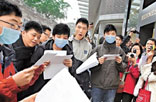A purchase with many advantages
Updated: 2011-12-01 08:17
By Huang Xiangyang (China Daily)
|
|||||||||||
For me, a yellow school bus used to conjure up joyful memories of trips to and from school, journeys filled with warmth, laughter and safety.
But not anymore. A series of school bus accidents in China mean that whenever I see a school bus now, it brings to mind only sadness and tears. In the latest tragedy earlier this month, 19 preschoolers died when their 9-seat van, which was crammed with more than 60 children - try and imagine that - crashed head-on into a truck in Zhengning, Gansu province.
There is no official death toll for children killed on their way to school each year in China. But according to professor Yuan Guilin, a member of the Chinese Society of Education, more children have died in school bus accidents in the past year than miners have been killed in accidents in illegal coalmines. To put that in perspective, he is saying a dozen children die each day on their rides to and from schools.
Children are called "the flowers of the motherland" and in a country where most families are allowed to have only one kid, children are sometimes pampered like "little emperors". But for most young souls, life is an endless battle for high scores in exams and they are burdened with too much homework and the high expectations of their teachers, parents and grandparents. The adult world has bequeathed them polluted air, contaminated food and flawed education. It is heart-rending that now even the road to school is all too often perilous, and sometimes deadly.
Yes, China is a developing nation and its education input as a percentage of GDP is even lower than most countries in Africa. Yet our balance sheet is far better than most nations; we have $3.2 trillion in foreign exchange reserves. Surely it would be more rewarding for the money to be invested in our children - the future of our nation - than in US Treasuries.
How? My modest proposal: Buy school buses from the United States.
It is not that China is not able to build its own buses, but because I think it is a good way to ensure that our children can travel safely, while also solving the thorny issue of unbalanced trade that has long hampered the fragile, yet important, relationship between the two countries.
Beijing has attributed its huge surplus to Washington's restrictions on high-tech exports - "You don't sell what we want to buy." Nevertheless, it has tried to narrow the gap by signing corporate export deals worth billions of dollars to buy wheat, software and airplanes from the US.
It is a pity that the long-nose school bus has never been on Beijing's shopping list. The US boasts the world's most advanced school buses. Thanks to its special design, from chassis to seats, a US school bus guarantees a safer ride than any other form of transportation - including rail and air travel. According to the US National Academy of Sciences, a child is 13 times safer in a school bus than in any other mode of transport.
China has about 200 million school children, but has few school buses with safety standards comparable to those in the US. It is estimated that the market potential for school buses in China is at least 1 million units and worth hundreds of billions of dollars. If US school buses could find their way to China it really would be a win-win solution.
For the US, it would help create jobs and cut the trade deficit. For China, it would mean not only a much safer ride to school, but also a new investment channel to divert the risk from its large holding of US debt, which has been losing value due to the unbridled printing of the greenback.
Four decades ago a ping-pong ball broke the ice in Sino-US diplomatic relations. Today the school bus could help break trade deadlock between the two nations. But it would also mean a whole lot more.
US President Barack Obama has said: "We want to sell you all kinds of stuff."
I say: We want school buses.
The author is a writer with China Daily.
(China Daily 12/01/2011 page8)




